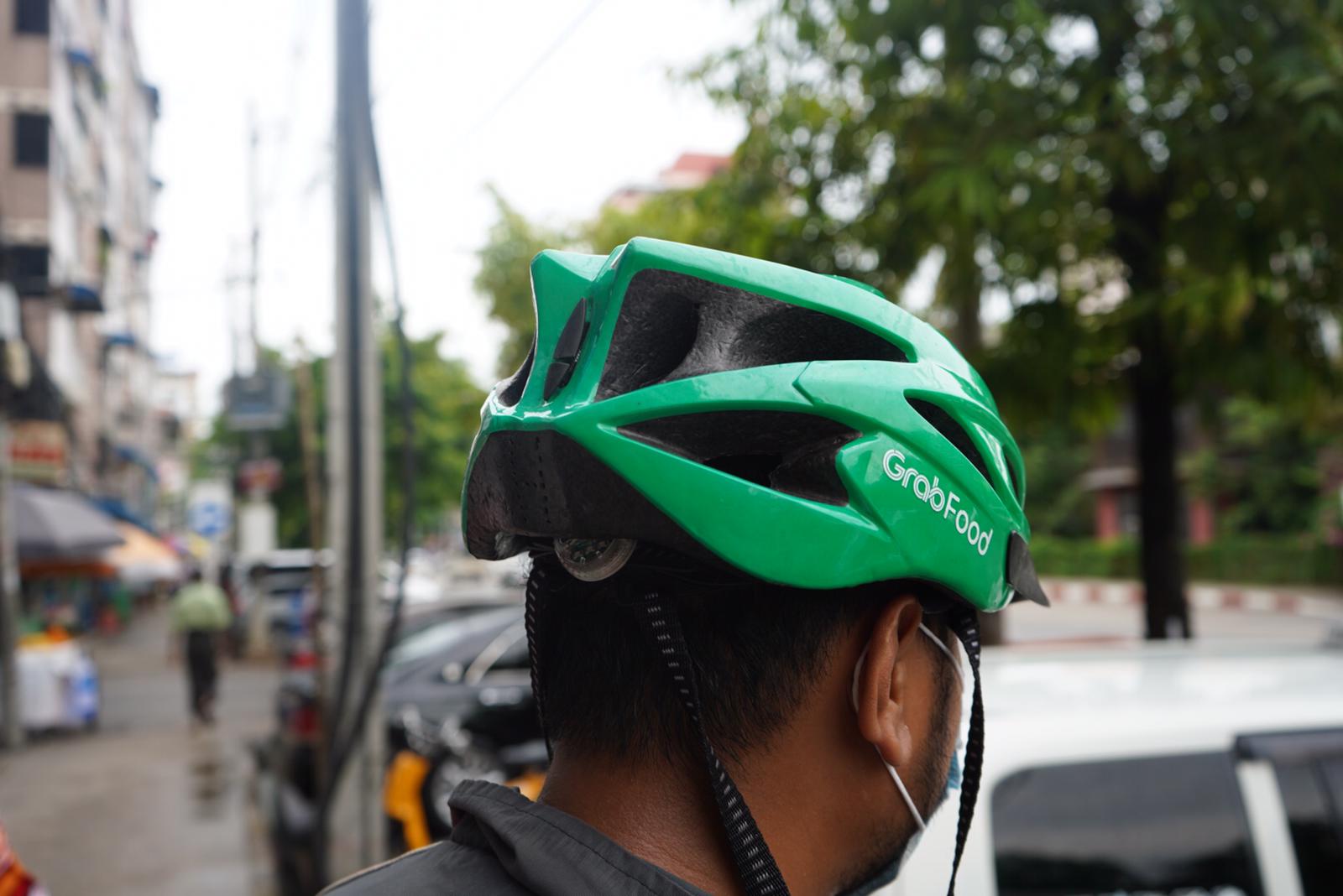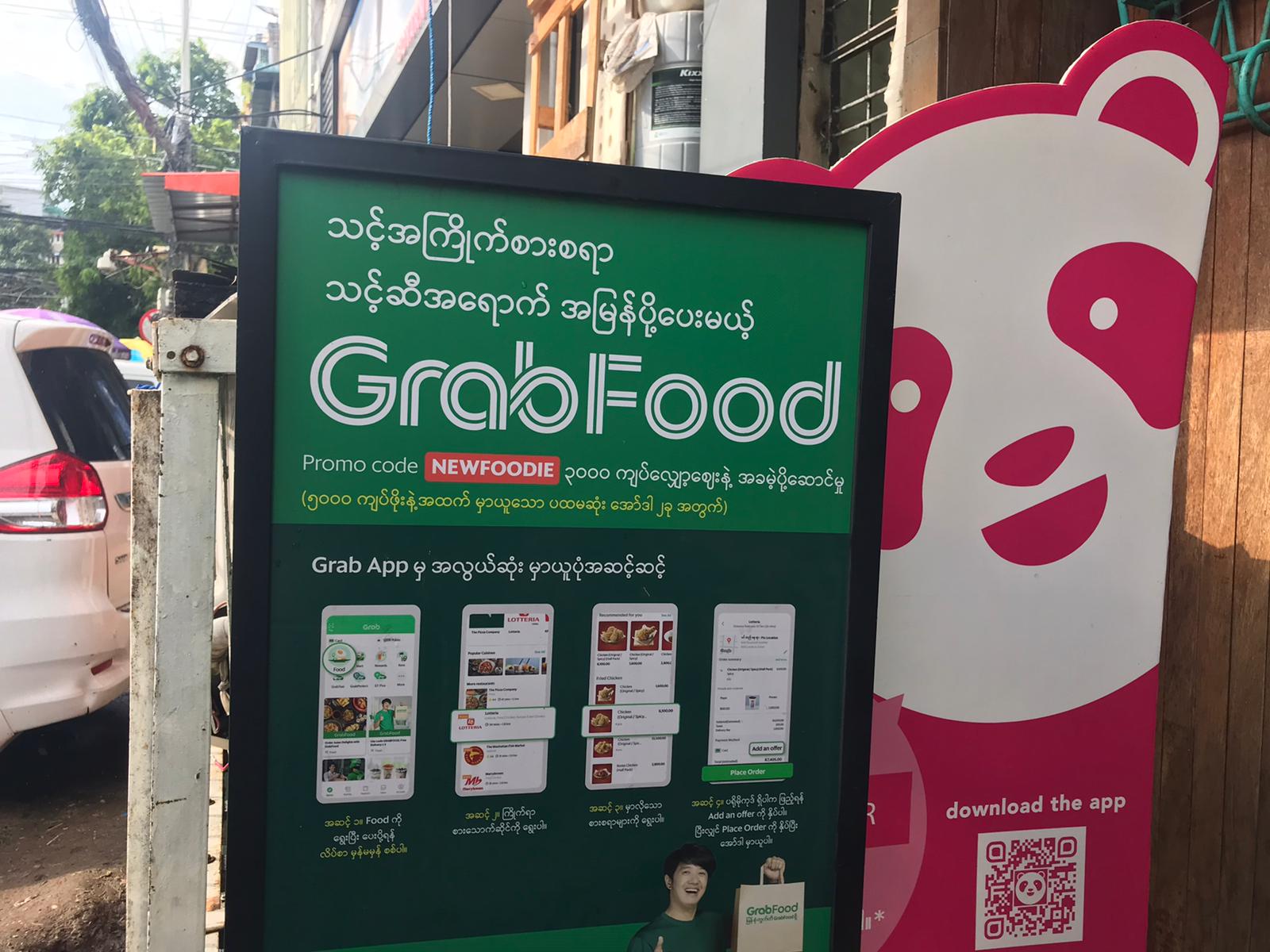A bustling array of green, pink, red, and yellow-vested food delivery riders on bicycles, each shouldering a food delivery box, became a ubiquitous sight in Yangon after the COVID-19 pandemic broke out in March. Whether under the scorching sun or heavy rain, delivery riders were jammed for time to bring orders to those avoiding excursions.
As the outbreak upended the livelihoods of many in Myanmar, leaving over 60,000 factory workers jobless or in dire straits, many Burmese turned to gigs such as food delivery.
Min Min, who preferred not to reveal his real name, was attracted by the high compensation and flexibility of food delivery jobs. He returned to Yangon in late 2019 after working as a quality control worker in Thailand for several years, and was employed as a night shift security guard for a residential building. However, the meager monthly pay of MMK 150,000 (USD 96) was not enough for him to support his aging parents, nor enough for his upcoming wedding, so he joined Foodpanda as a daytime part-time delivery driver.
Without the need for any major qualifications, signing up as a food delivery rider is simple—riders have to fill in personal details online or visit the offices of one of the food delivery companies operating in Myanmar. After filling in their personal information, aspirant riders usually need to watch a video that explains how to use the app and pay a deposit for the equipment, which ranges from MMK 20,000 (USD 13) to MMK 85,000 (USD 55), depending on the operator. Riders are then ready to start their new job.
While Myanmar’s minimum wage is set at MMK 4,800 (USD 3.1) for an eight-hour workday, or MMK 600 (USD 0.40) per hour, a food delivery rider could earn up to MMK 2,000 (USD 1.30) per hour, according to information on Foodpanda’s website. Foodpanda is one of the global food delivery firms that entered Myanmar’s market in 2019. Other food delivery companies operating in the country are GrabFood, and local players Food2U, Food Mall, Hi-So, and Yangon Door2Door.

Min Min decided to turn his gig work at Foodpanda into full-time employment when, in a quick turn of events, he was sacked from his full-time job as a security guard. “I used to work for Foodpanda seven days a week. Eleven hours per day. I could earn as much as MMK 200,000 (USD 129) per week if I worked really hard,” he told KrASIA. The remuneration he received was even higher than the salary of an entry-level white-collar worker in Yangon, who earns around MMK 300,000 (USD 193) per month.
Newly wed in January this year, he hoped to maintain the same work schedule so he could earn a stable income to support his family. However, his hope was dashed in February as the junta seized control of the government, leading to a series of crackdowns on the streets, mobile internet bans, and a recurring curfew between 8:00 p.m. to 4:00 a.m. for all residents.
“Since the coup, orders have dropped drastically. The situation got much worse after the junta cut the mobile internet in mid-March. If we want to receive orders, we need to go to a restaurant that is equipped with fiber internet,” Min Min said.
“Only people who have fiber internet at home could access the internet and order food online. However, having a fiber internet is a luxury for many people. I haven’t received any income at all since the mobile internet was cut. This has greatly affected my livelihood,” he emphasized, adding that the mobile internet suspension also hindered him from looking for extra job opportunities online.
While the political turmoil and mobile internet blackouts have hit riders’ livelihood, food delivery riders at Foodpanda and Grab told KrASIA that they have also been regularly experiencing unsafe situations on the road. Food delivery drivers are mostly considered as “partners” by tech firms like Grab and Foodpanda, which means they are not formal employees—but contractors or freelancers—who are not granted any labor protection or employee benefits like medical insurance and paid vacations.
Read more: ‘I lost my bike and could barely afford my three meals’—how the virus hit Indonesia’s gig drivers | Tech in Culture
Myanmar’s digital economy hit by the political turmoil
With 55% of its inhabitants under the age of 30, Myanmar has been described by analysts as a “young country” with all the ingredients to grow its digital economy, including a high mobile phone penetration rate of 114% and a swelling middle class. A 2013 report by the McKinsey Global Institute forecasted Myanmar’s digital economy to rise from USD 100 million in 2010 to USD 6.4 billion in 2023. Political turmoil has knocked that trajectory of growth off course.
The arrival of Foodpanda and GrabFood was emblematic of the country’s nascent burgeoning digital economy. Regional ride-hailing firm Grab entered Myanmar as early as 2017—pledging a USD 100 million commitment for its expansion—just one year after the United States government lifted its economic sanctions on Myanmar. Grab started to pilot its food delivery services in November 2019 and made GrabFood available in Yangon and Mandalay in January 2020.
Foodpanda, the Asia-focused subsidiary of Germany-based Delivery Hero, launched its service just a little earlier than Grab, in December 2019. The firm has since amassed over 1 million users and 7,000 delivery riders, The Irrawaddy reported.
Before the entry of these international players, other local food delivery operators had already sprung up to fill the increasing demand, including Yangon Door2Door, Food2U, and Food Mall.
The scene of food delivery riders shepherding meals across the capital has morphed into chaos and bloodshed since February. With nonstop protests taking place in Yangon and other parts of the country, the total death toll has climbed to 807, while 4,120 people have been arrested, charged, or sentenced during the 106-day crackdown by the military as of May 19, according to data from the human rights group Assistance Association for Political Prisoners (AAPP).
Shady Ramadan, founder and CEO of food delivery service Yangon Door2Door, saw one of its riders arrested on March 1 in the Sanchaung district of Yangon. “Our rider was caught by security forces while he was doing his job. We went straight to the police station right after learning about the incident, and I tried to get him out,” he told KrASIA.
“It took us two and a half weeks to find a CCTV clip to prove that he was just delivering food and was not involved in any of the movements on the street. In the video, we saw that our rider was just passing by, and all of a sudden, security forces pointed a gun at him,” Ramadan said.
Although the rider was eventually set free, the fear and anxiety among his colleagues persist.
“Security forces are almost everywhere in Yangon. You never know what will happen next. I am very concerned about the situation on the streets. However, I have to work. I will bypass all checkpoints whenever I see one. We are working under immense duress,” said Min Min.

Reports of security forces taking food and cash from food delivery couriers have also emerged. According to local news publication The Irrawaddy, security forces reportedly took MMK 500,000 (USD 321) and meals from a Foodpanda courier outside Hledan Center, a shopping mall located in the Kamayut Township of Yangon, on April 17. KrASIA could not independently verify the veracity of this report.
“If an order is looted by security forces, I would have to pay for the order myself, but I can’t afford to pay it,” said Min Min, adding that the support channels offered by Foodpanda are not sufficient.
“There is a private chat group on Telegram that Foodpanda uses to share information. Meanwhile, Foodpanda also listed three hotlines that riders could call if anything happens to them. Some friends of mine tried to call the numbers. However, one number is always busy, while the other two hotlines are unreachable,” Min Min said.
Some riders are even selling their Foodpanda accounts on Facebook, as seen by KrASIA. “Many riders who have difficulty earning a living at Foodpanda need to find another job. Some of them decided to sell their accounts to cash out immediately. An account usually costs MMK 80,000 to MMK 100,000 (USD 51–64), depending on the equipment included in the transaction,” said Min Min.
Riders working for Grab are experiencing similar difficulties. A Grab courier who identified only as Paing, told KrASIA that there were times when he did not have any income at all. “I borrowed about MMK 30,000 from my friends and relatives to support my family for a week. I also sold my cooking pot and some clothes to a pawn shop to get an additional MMK 8,000 (USD 5),” Paing said. He added that to be able to call his customers to ask for precise delivery locations, he needs to spend a lot to top up his phone credit, yet he does not receive compensation from Grab.
Both Foodpanda and Grab declined KrASIA’s requests for comments on the matter. Foodpanda cited the “instability situation in the country and safety concerns,” while Grab offered no explanation.
Food delivery business at a standstill
In the current situation, many riders have also pleaded for donations or looked for other delivery jobs on Facebook. A group on Facebook called Foodpanda YGN Rider Group, created last August, has become a networking space where Foodpanda riders seek delivery opportunities. With over 21,000 users, the group accommodates riders and customers looking for delivery services and those willing to make donations.
According to Min Min, a Foodpanda rider could get a maximum of MMK 900 (USD 0.60) per order through the platform, but customers on the Facebook group are willing to pay minimal fare starting at MMK 2,000 (USD 1.30) per delivery, covering all types of goods.

Unlike Grab and Foodpanda, local operator Yangon Door2Door treats all its full-time riders as formal employees, Ramadan said. Founded in 2013, with backing from four investors like BOD Tech Ventures, the firm only became profitable in 2019, according to a report by local publication Myanmar Times. With around 300 food delivery riders on the books, the firm operates in Myanmar’s largest cities, Yangon and Mandalay. Just recently, however, it had to shut down operations in Bagan, a popular tourist destination, as a result of the coup.
The company pays its full-time riders a monthly base salary that starts at USD 120, depending on their level of experience, while riders are also paid MMK 300 to MMK 1,000 (USD 0.18–0.61) per order based on the delivery distance. Door2Door’s drivers receive medical insurance, according to Ramadan.
“Unlike our competitors, which lure customers to join their service by offering free deliveries, we believe that every delivery service should be paid. When customers order food online, they will have an assumption that delivery should be free. Customers are spoiled because of our competitors. But we believe that a rider deserves fair pay and labor protections,” he said.
However, this model has made his business even more fragile than others. The business has dropped 70% in February and March compared to the same period last year. “There were shootings on the street, together with curfews and mobile internet cuts. We were forced to shut down our businesses most of the time,” he added.
Ramadan revealed that his firm will roll out two mobile-based applications by the end of May. The first one is a mobile app for the food delivery service, as Yangon Door2Door is currently only available through a web browser. The second app will be for a new on-demand delivery service. The on-demand delivery app is set to target small and medium vendors on Facebook, connecting them with customers who prefer to stay indoors. “We are aiming to deliver goods within two hours,” he said.
“The only thing I want now is more orders”
Despite the financial burden, Paing felt a sliver of support when Grab offered each rider a small bonus of MMK 5,000 (USD 3.20) in April during Thingyan, the annual water festival that marks the start of a Burmese new year. The firm has also been supporting riders in their daily activities, Paing said.
“There is a contact number of a leader who takes care of a group of riders in a certain area. “If a rider gets caught by the authorities, he or she could contact the office right away, and they could help us,” Paing said. “The only thing I want now is more orders.”
Ramadan of Yangon Door2Door believes that the safety of their employees is the most important thing for the company. The firm has also established a safety team composed of four team leaders, where each leader is responsible for a group of riders in Yangon and Mandalay. After receiving an alert over incidents or protests on the streets, team leaders are responsible for visiting the site in a car to check the conditions. “If there is an accident on the street, making it unsafe for drivers, the team leader will inform the manager, and the manager will talk to senior officials in the company who will decide whether operations should be ceased in a certain area,” Ramadan explained.
As authorities reduced the nationwide curfew by two hours from May 4, (now active from 10:00 p.m. to 04:00 a.m.), Yangon Door2Door’s business is slowly bouncing back. “Since April, 70% of our business has come back. However, the recovery rate is really slow. A big part of our customers are expats, and most of them have left the country already. However, as the curfew is lifted, our business is increasing as we have two more hours to deliver,” Ramadan said.
Even if the regime has restored limited mobile internet since April 26, and some riders are slowly getting back on the roads again, fear and anxiety of not knowing what might happen next still loom.
“I am delivering food to others so they do not need to go out and risk their lives,” Min Min said.
This article is part of KrASIA’s “Tech in Culture” series, where the writers of KrASIA unpack how tech is changing the status quo across Asia.


